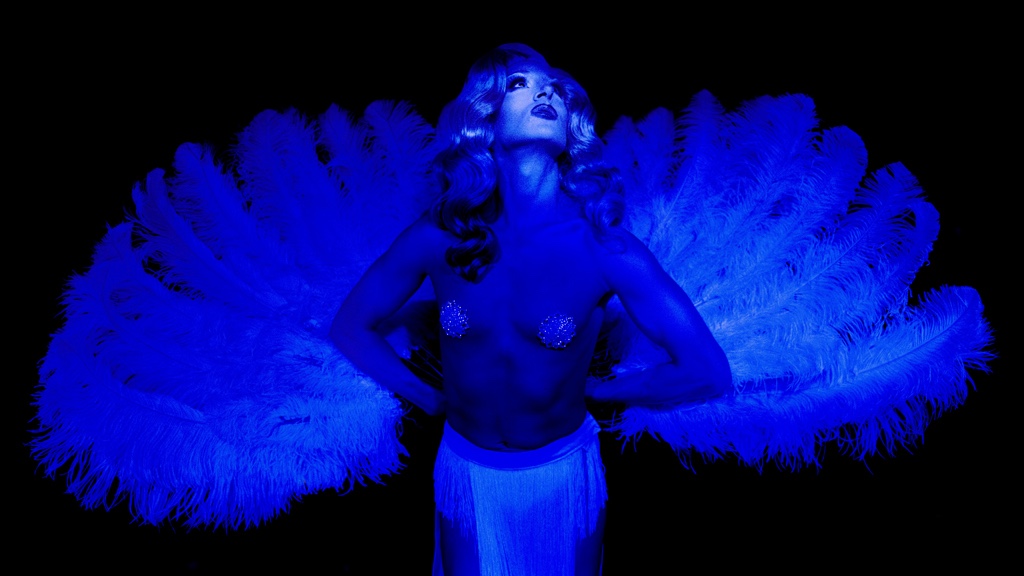Theater Review by Alix Cohen . . . .
I reviewed this terrific play with its original star, Wade McCollum, and have returned to see the burgeoning interpretation by Darius Rose (drag alter-ego Jackie Cox). Exposition has increased, sometimes unnecessarily, one presumes for clarity. The story remains captivating.
Kenneth/Kate Marlowe was a self-proclaimed hustler, hairdresser, accidental Madam, female impersonator (then, gender illusionist), stripper, army private, Christian missionary, mortuary cosmetologist, newspaper columnist (horoscopes), the author of eight published books and the first transsexual married in a prison—to a lifer. (This happened after the play.) For the last decade of Marlowe’s life, she was Kate, a woman.
The heroine makes her way from the back of the theater, singing “…we can wear powder/We can wear paint/ We can even make you think we are what we ain’t…” She’s literally light on her feet. “Life, am I right?” Marlowe rhetorically asks with as yet comic timing. “I was born in Iowa 1926—I know I look good…” The persona is subtly girlish. It’s 1975. Pre-Stonewall. She’s looking back.
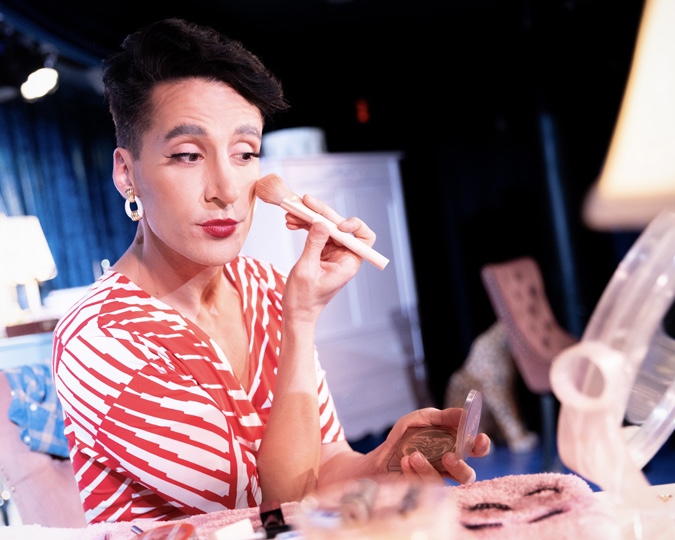
Mrs. Marlowe wanted a daughter. It’s an old story. She dressed young Kenneth in “bloomers, bonnets and pink bows” until her child was four. The boy loved playing dress-up. She was pretty. Relatives cooed. A first crush in high school evokes fantasizing about “setting up a home and cooking chicken.” She sighs. There’s a lovely pause.
Self-recognition was immediate. Marlowe became the local “candy store” = gleefully available. Curiously there were, in this telling, next to no repercussions. In fact, her life careened through mishaps, threats and disasters (several fires) like a pinball in a padded machine, almost always landing on her feet, always optimistic.
In men’s rooms and movie theater balconies, teenaged Marlowe learns a secret language of handkerchief placement as indication of sexual disposition. Demonstration takes Rose into the audience where she ties a scarf around the neck of a blushing stranger up front. There’s no fourth wall. Periodically interacting with the audience, the actor draws us in, flirting a bit, asking for advice, confirmation. Nothing feels forced.
Dressing in drag for Halloween, lipstick is applied. Later eyelashes and brows will be added: “They have to be symmetrical or you’re going to look permanently inquisitive.” She wins the costume contest. “I like this thing called drag.” Mr. Marlowe chances on his son in regalia and beats her up. “People stared. Did they wonder why a grown man was beating up a little girl?”
One day she wanders into a church “…singing and smiling; they thanked me for coming…” (A new line, “Cause that’s what you do when you quit drag” is gratuitous.) Mom becomes an alcoholic and oddly against religion. She sends Kenneth to relatives on the West Coast. There Marlowe meets streetwise Candy and Candy’s Sancho Panza, Dutchess. Rose pivots between some 35 characters, most with distinctive voices.
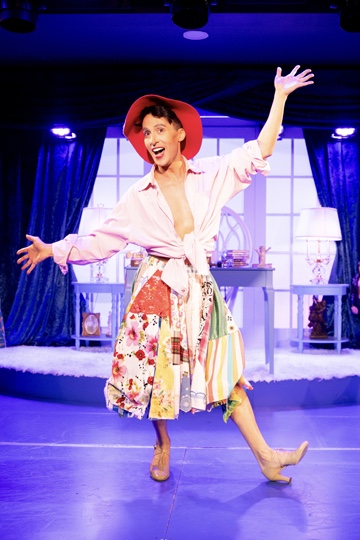

The Iowan is christened “Princess” and taken under more savvy wings. She gets arrested with her new friends. “Do you know your nephew is fraternizing with known homosexuals?!” the officer asks her aunt. “I had make-up on! Straight people are so unobservant.” (New line. For whom?)
When money runs out, Candy suggests the fledgling turn tricks—“You mean charge for it?!”—which leads to hoped-for security in the form of an unfortunately unappetizing Sugar Daddy, Charley. “Should I go with him?” Marlowe asks the audience. Circumstances are negotiated. Candy advises, the mentee listens and learns. A stable parenthesis ensues. Allowance is notably spent on sprucing up the house.
Marlowe goes to beauty school and becomes a hairdresser. It’s time to move on. Chicago is next. Effusive charisma serves her work on the night shift of a 24 hour salon. “These are my people.” Client voices/personas are grand. Seen spontaneously performing atop a bar, she’s then hired as a drag entertainer at the huge sum of $100 a week unaware the club is owned by a gangster.
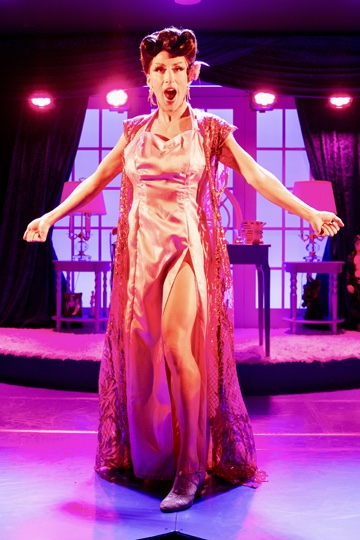

Under the name Mr. Kenny Marlowe, Queen of the Boys, she meets Sally Rand and exchanges coiffure for lessons in the burlesque queen’s famous fan dance. Graceful, decorously lit and beautifully costumed, this version is without its famous coy appeal. Instead of seductively hiding body parts, Rose unabashedly exposes everything arms wide. It loses something. Rand later became Kenneth’s hair client and friend, as did Phyllis Diller and Gypsy Rose Lee.
A subsequent big song number feels too long. Rose doesn’t seem to have chosen a vocal style yet. Fleeing to New Orleans, she secures another gig. Now sober, mom shows up. “Oh, my land, you must be chilly!” They reconnect.
Back in California, Marlowe sets up an answering service and inadvertently becomes a Madam. “It started innocently…” Candy makes her aware of the possibility of gender reassignment. The Ball to End All Balls is thrown to raise money.
Towards the end of the play, the heroine suffers horrible abuse in the army. Why she didn’t declare herself is a puzzlement. The adroitly manifest event is painful to watch, but without prior, deeper involvement, not as empathetic as it should be (and was). Marlowe recovers, slowly rising like a determined phoenix, transitioning in 1975/76. Armistead Maupin based the iconic landlady Ana Madrigal in his “Tales of the City” on Kate Marlowe. What I’ve written is by no means her entire story.
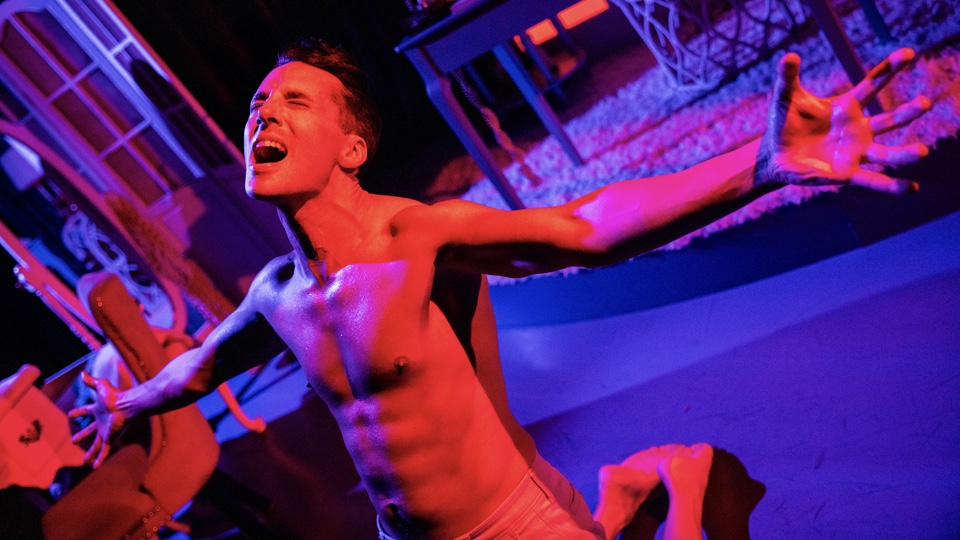

Darius Rose has open-faced freshness and a drag performance pedigree, but she’s not an actor with depth. Though entertaining and a helluva yarn, Gorgeous is less moving than its first iteration. Of course, if you haven’t seen the first version . . .
Donnie wrote a play about a Portland Oregon Madam and wondered whether there had been a male equivalent. He found two, Scotty Bowers, who procured gay prostitutes for Hollywood insiders, and Kenneth/Kate Marlowe, whose trailblazing life touched him. Gorgeous was initially a book published by the writer’s Triangle Productions. In turning it into a play, Donnie hopes to reach more of the community inspiring empowerment and celebration.
Walt Spangler’s marvelous pre-Barbie-ish set is a pitch-perfect amalgam of the era and feminine fantasy. Production Props (Brendan McCann) add specificity and wit. Jeffrey Hinshaw’s costumes offer tacky, aspirational stage wear, half masking, half glorifying womanhood. (The bodice on the pink gown needs tailoring.)
Make Me Gorgeous! Through February 25 at Playhouse 46 at St. Luke’s (308 West 46th Street, between Eighth and Ninth Avenues). www.gorgeousplay.com
Photos: Maria Baranova


